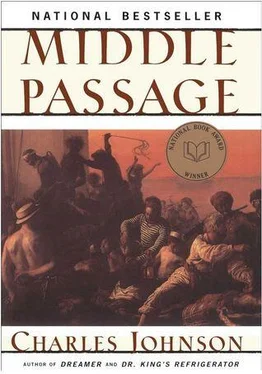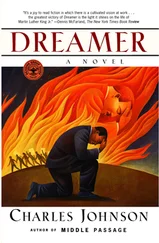All my life I’d hated him because he had cut and run like hundreds of field hands before him. He was a dark man and fiercely handsome, to hear Jackson tell it, and even when he was tired after a day’s work he could whip a guitar like nobody’s business and sing until it made grown women cry. They liked him, the womenfolks, but Da wasn’t so popular with the men who sometimes found his old, wired shoes next to their pallets. A couple tried to kill him, said Jackson, and lost because Da was big through his chest and could lift a cow his damnself, then afterward he’d bring stump whiskey to whomever he’d whooped, saying he was sorry for all the bedswerving and scrapping and gambling he did — that he couldn’t help it, and besides, it wasn’t really his fault he acted thataway, was it? “Looka how we livin’,” he’d say. “Looka what they done to us.” You couldn’t rightly blame a colored man for acting like a child, could you — stealing and sloughing off work when people like Peleg Chandler took the profits, and on top of that so much of their dignity he couldn’t look his wife Ruby in the face when they made love without seeing how much she hated him for being powerless, even with their own children, who had no respect for a man they had seen whipped more than once by an overseer and knew in this world his word was no better than theirs. Each time Da talked like this, checking off cankers and cancer spots of slavery on his porch in the quarters, the other men listened, even those who hated him for pestering their wives, their eyes rage-kindled and drifting away to old angers of their own. “We was kings once,” he would say, scrawling with one finger on the dusty porch a crude map of an African village he remembered vaguely (and neglecting to add that in his tribe his own family was not royalty but instead the equivalent of Russian serfs or Chinese coolies). “We lost a war — naw, a battle. So now we’s prisoners. And the way I see it we supposed to keep on fightin’.”
Most of the time Da did fight. Never Reverend Chandler, though. Rather, he fought his family and others in the fields, chafing under the constraints of bondage, and every other constraint as well: marriage and religion, as white men imposed these on Africans. Finally, in the light of my slush lamp, I beheld his benighted history and misspent manhood turn toward the night he plotted his escape to the Promised Land. It was New Year’s Eve, anno 1811. For good luck he took with him a little of the fresh greens and peas Chandler’s slaves cooked at year’s end (greens for “greenbacks” and peas for “change”), then took himself to the stable, saddled one of the horses, and, since he had never ventured more than ten miles from home, wherefore lost his way, was quickly captured by padderolls and quietly put to death, the bullet entering through his left eye, exiting through his right ear, leaving him forever eight and twenty, an Eternal Object, pure essence rotting in a fetid stretch of Missouri swamp. But even in death he seemed to be doing something, or perhaps should I say he squeezed out one final cry where-through I heard a cross wind of sounds just below his breathing. A thousand soft undervoices that jumped my jangling senses from his last, weakly syllabled wind to a mosaic of voices within voices, each one immanent in the other, none his but all strangely his, the result being that as the loathsome creature, this deity from the dim beginnings of the black past, folded my father back into the broader, shifting field — as waves vanish into water — his breathing blurred in a dissolution of sounds and I could only feel that identity was imagined; I had to listen harder to isolate him from the We that swelled each particle and pore of him, as if the (black) self was the greatest of all fictions; and then I could not find him at all. He seemed everywhere, his presence, and that of countless others, in me as well as the chamber, which had subtly changed. Suddenly I knew the god’s name: Rutherford. And the feel of the ship beneath the wafer-thin soles of my boots was different. Not like any physical surface I knew, but rather as if every molecule of matter in her vibrated gently, almost imperceptibly, and the effect of all this was that from bowsprit to stern she seemed to sing like the fabled Argo.
Then I fainted.
Or died.
Whatever.
A long, long interval passed in the most unimaginable quietude. Silence as deep, as pervading as the depths of the sea. There was stillness, the sweet smell of growing things, then their stench. I heard screaming, felt it barreling out of my bones. I was thrashing and two Josiah Squibbs were holding me down in the fo’c’s’le — my sight was distorted, I saw everything in doubles — mopping my brow with his kerchief. Apparently he had been feeding me from a bucket by his left elbow. Feeding me the choicest cut of medium-raw steak, unless the meat on the fork in his right hand was a product of my prolonged fever. Once he saw me awake, Squibb set down his fork and began fooling with my arm.
“Lie back now, bucko. Yuh need to bleed,” said he. “And pray.”
Beside him were instruments of venesection that made me cringe: fleams, thumb lances, and a copper bleeding bowl. I was not, I should mention, an advocate of bleeding, cupping, or leeches, though these medical practices still lingered on ship when all other methods had failed. I wondered: Was this necessary? And, more to the point, was Squibb capable of carrying it off without killing me? Nay, I was not eager for this, but I knew the cook, so tired, was ready to try everything he’d seen to save us. Squibb’s cold hands rubbed my right arm vigorously; he consulted astrological charts to confirm that the hour was right for an incision and tightened a rag just below my elbow to enlarge the vein.
“Josiah, half a moment—”
“Don’t talk. Ain’t nothin’ to say.” The cook’s face was pale as a scrubbed hammock, his eyes as red as a pigeon’s. He shoved a stick into my hand and demanded I squeeze it. “This’ll balance the humors, though Gawd knows I don’t know what happened to yuh. We pulled yuh hup from below. Yuh been out of yer head fer a long time. Christ, lad, yer hair’s sugah white.”
“How long?”
“Three days full. Ever since yuh went below. But lissen. We spotted a ship this mornin’, boy!”
“Whereaway?”
“Two miles to leeward in the southeast corner.”
“Her flag?”
“None. Leastways none I kin see, but I think she’s American. She’s been following us hank fer hank, tryin’ to eat our wind. I think her skipper knows we’re in trouble. If she’s British, we’re sunk. They’ll search us and charge you ’n’ me with murder!”
“Peter hailed her, then?”
Squibb stiffened, shipped a long face, then looked at the bucket from which he’d fed me. “Yuh had Mr. Cringle fer supper, m’boy. We all did. Now, lie back, dammit! This was what he wanted. I was sittin’ with him toward the end, which he knew was comin’. Yuh know, when a body goes the bladder ’n’ bowels fly open — I seen it happen a hundred times — and yer mates have to clean yuh hup and all. He wanted to spare us that, so he asked the blacks to he’p him to the head. After he was done, he had a few mates gather round him. By that time we was eatin’ our shoes, barnacles, ’n’ the buttons off our shirts. The women and children had chewed every shred of leather off the pumps. So Cringle says, in a voice as calm as a chaplain’s, ’My friends, I have no inheritance to leave my family in America. They’ll not miss me, I’m sure, but I wish to leave you something, for no man could ask for better shipmates than thee. You’re brave lads. The lasses have given their full share as bluejackets too, and methinks ’tis scandalous how some writers such as Amasa Delano have slandered black rebels in their tales. Of course, I fear you’ll get ptomaine if you put me into a pot, but I’ve nothing else to give. I hope this will help. Please, leave me a moment to pray. . ’
Читать дальше












